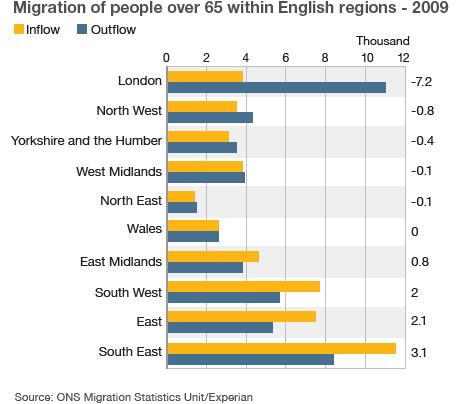England's elderly care funding 'not enough' to cope
- Published

England's over 50 population will increase by 1.3% every year until 2029, research suggests
A charity has warned care funding is not enough to cope with an ageing society as BBC-commissioned research suggests half of residents in some areas will be aged 50 plus by 2029.
Age UK said the country's care system was "in crisis" and urged the NHS to focus more on the health of over 65s.
Care minister Paul Burstow said work was being done to reform social care.
The Experian research suggests England's over 50 population will grow at an annual rate of 1.3% until 2029.
The research is part of a new BBC project called Living Longer, which looks at how areas of England will be affected by an ageing population.
With rising life expectancies and improved healthcare, people are ageing more slowly and living for longer.
Ageist barriers
The 50 plus population in the UK has grown steadily over the last 10 years.
It grew overall by 1% between 1999 and 2009, according to the Experian research.
But with the "baby boom" generation due to hit retirement age, it is expected to grow at a yearly rate of 1.3% between 2009 and 2029, the research suggests.
Michelle Mitchell, charity director at Age UK, warned more investment in services that an ageing society will rely on needed to be made.
"Our care system is already in crisis and current levels of funding are not enough to cope with increasing numbers of older people living with a range of health and support needs," she said.
"We need to tackle health inequalities which create huge variation across the country in life expectancy and the NHS needs (to) focus more on improving health outcomes for over 65s."
She said the growth of the elderly population was cause to celebrate but added employers needed to provide more job opportunities for them and remove "ageist barriers" which often prevent them getting back into work.
"There is no excuse for not planning ahead to ensure health care, pensions and other services are able to meet the needs of an ageing population," she said.

Mr Burstow said the government was aware urgent reform of the social care system was needed.
"That's why we established an independent commission to consider how we ensure affordable and sustainable funding for care and support for all adults in England," he said.
"The commission will report to us next July and we will bring together its findings with other work we are doing on care and put proposals before Parliament."
He said the government had taken action to ensure services are prepared to meet the pressure of an ageing population, including providing an extra £2bn a year for social care by 2013-2014.
More than 40 out of 324 local authorities in England are expected to have at least half of their population aged 50 or over by 2029, according to the Experian research.
West Somerset will have the highest concentration of 50 plus residents - 62.8% will be in that age bracket.
West Dorset is expected to have the second highest concentration of people in that age group, at 59.7%, and Rother in East Sussex has the third with 58.5% of its population aged 50 plus.
The South East saw the largest number of adults aged 65 or over move into the region in 2009 and London saw the most move out.
The current UK average concentration of people aged 50 or more is 34.5%, which is expected to rise to 38.6% by 2029.
- Published28 October 2010